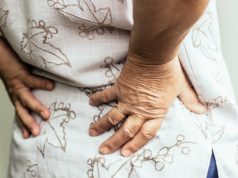 Emergency patients treated with naproxen and placebo had outcomes as good as or better than patients treated with naproxen and diazepam for acute lower back pain, according to the results of a double-blind, randomised clinical trial published in Annals of Emergency Medicine.
Emergency patients treated with naproxen and placebo had outcomes as good as or better than patients treated with naproxen and diazepam for acute lower back pain, according to the results of a double-blind, randomised clinical trial published in Annals of Emergency Medicine.
“Our study contributes to the growing body of literature indicating that, in general, most medications do not improve acute lower back pain,” says lead study author Benjamin Friedman of the Albert Einstein College of Medicine/Montefiore Health System in the Bronx, USA. “One week after being discharged from the emergency department, lower back pain patients had improved equally, regardless of whether they were treated with naproxen and diazepam or naproxen and placebo. By three months after visiting the emergency department, most patients had recovered completely, regardless of what treatment they received.”
Researchers randomised 114 patients who came to the emergency department with new-onset lower back pain to two groups: one group was treated with a combination of naproxen (a non-prescription, non-steroidal anti-inflammatory medication) and diazepam and the other was treated with a combination of naproxen and placebo. One week after visiting the emergency department, the diazepam group improved by 11 points on the Roland Morris Disability Questionnaire, as did the placebo group.
After one week, 31.5% of the diazepam patients reported moderate or severe lower back pain, while 21.8% of the placebo patients did. At three months, 12% of diazepam patients reported moderate or severe lower back pain, while 9% of placebo patients did. The differences were not considered clinically or statistically significant.
“Millions of patients come to the emergency room every year seeking relief for back pain, which can be debilitating,” says Friedman. “Unfortunately, we have yet to come up with the silver bullet in pill form that helps them. If anything, we may be overmedicating these patients.”













